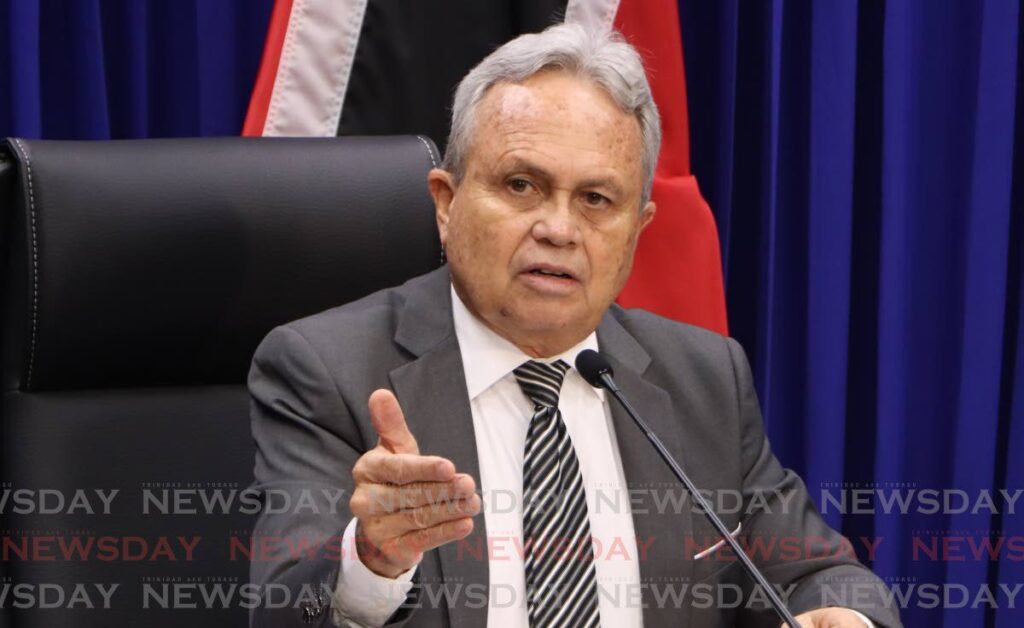Imbert: Trinidad and Tobago must balance transition, economic stability

WHILE Trinidad and Tobago may be a leader in renewable-energy infrastructure development in the English-speaking Caribbean, Finance Minister Colm Imbert insists a transition from oil and gas is not a short-term objective. He says this transition must be done gradually to avoid major economic disruption.
Speaking at the launch of the 2024 Report on Economic Development (RED) by the Development Bank of Latin America and the Caribbean (CAF), at the Central Bank Auditorium, Port of Spain, on December 2, he stressed the importance of balancing global climate goals with the economic realities of fossil-fuel-dependent economies such as TT's.
“The global push for a zero-carbon future highlights the challenges faced by energy-based economies like TT,” he said. “While we recognise the need to address climate change, our approach to energy transition must be measured and sensible.”
TT’s economy relies heavily on oil and gas, which account for a significant portion of government revenue and exports.
“We simply cannot abandon the production of oil and gas,” he said, admitting to the importance of reducing TT’s carbon footprint.
“One of the issues we as a country have is that they look at the per-capita emission,” he said, noting TT's comparatively low output against the world's leading emitters.
Imbert addressed practical measures to support the energy transition, including increasing renewable energy for electricity production, promoting electric vehicles and developing green energy sources such as hydrogen.
These steps align with the country’s nationally determined contributions (NDCs) under the Paris Agreement, which aims to reduce cumulative greenhouse-gas emissions in power generation by 15 per cent by 2030.
Energy Minister Stuart Young, also speaking at the event, detailed specific initiatives to advance TT’s renewable energy goals. He announced Cabinet's approval of the first green hydrogen pilot project at the Point Lisas Industrial Estate, with CAF funding.
Young noted green hydrogen is not yet economically competitive, saying current production costs range from US$10-US$15 per kilogramme, compared to US$3- US$5 for natural gas.
“The economics are not quite there as yet,” he said.
Young also highlighted TT’s position as a regional leader in integrating renewables into its energy mix.
Initiatives such as Project Lara, the solar energy grid at Brechin Castle and the ongoing wind turbine project, Young said, demonstrate the government’s commitment to diversifying its energy portfolio.
However, he said integrating renewable energy into the grid is a complex and costly process, particularly in maintaining grid stability with technologies like rooftop solar.
“If every roof in TT had a solar panel, for it to feed into the national grid, it would all have to go to substations that then regularise the electricity coming in,” he explained.
Imbert also highlighted the Caribbean’s acute vulnerability to climate change, with low-income communities disproportionately affected by floods, droughts, hurricanes and rising sea levels.
“Transitioning to clean energy can reduce greenhouse-gas emissions, safeguard the region’s resilience, and help bridge the poverty gap,” he said, warning about the social and economic stakes of inaction.
Imbert praised CAF’s support, noting that the development bank has provided this country with over US$1 billion in financing and technical assistance to support transport, health and renewable-energy projects.
Imbert also urged stakeholders to work towards a "just" energy transition and stressed that social equity and economic stability must remain central to the transition process.
Young echoed this, saying while TT is making significant progress, the energy transition must be methodical and backed by robust infrastructure and financing, which the government is committed to providing in the long term.

Comments
"Imbert: Trinidad and Tobago must balance transition, economic stability"